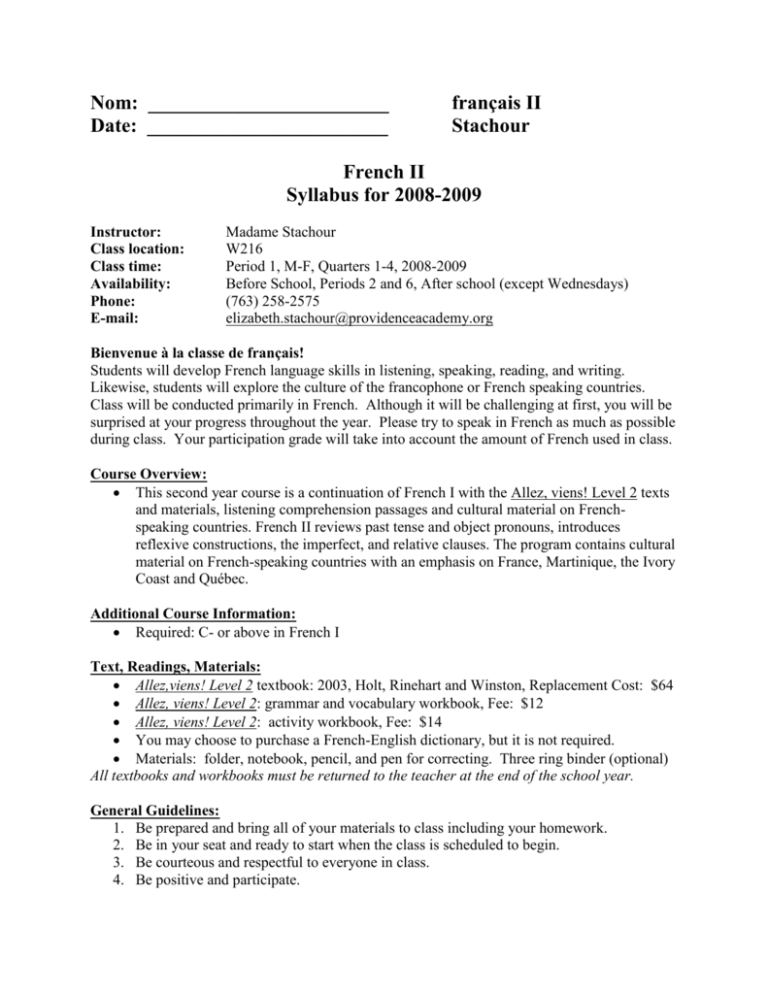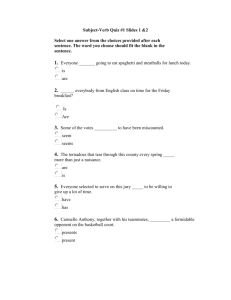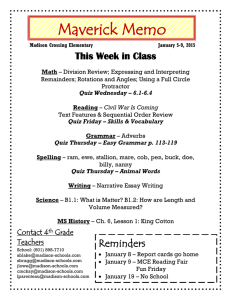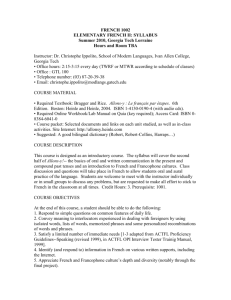Culture: Paris and Surrounding Area (Ile de la Cité
advertisement

Nom: ________________________ Date: ________________________ français II Stachour French II Syllabus for 2008-2009 Instructor: Class location: Class time: Availability: Phone: E-mail: Madame Stachour W216 Period 1, M-F, Quarters 1-4, 2008-2009 Before School, Periods 2 and 6, After school (except Wednesdays) (763) 258-2575 elizabeth.stachour@providenceacademy.org Bienvenue à la classe de français! Students will develop French language skills in listening, speaking, reading, and writing. Likewise, students will explore the culture of the francophone or French speaking countries. Class will be conducted primarily in French. Although it will be challenging at first, you will be surprised at your progress throughout the year. Please try to speak in French as much as possible during class. Your participation grade will take into account the amount of French used in class. Course Overview: This second year course is a continuation of French I with the Allez, viens! Level 2 texts and materials, listening comprehension passages and cultural material on Frenchspeaking countries. French II reviews past tense and object pronouns, introduces reflexive constructions, the imperfect, and relative clauses. The program contains cultural material on French-speaking countries with an emphasis on France, Martinique, the Ivory Coast and Québec. Additional Course Information: Required: C- or above in French I Text, Readings, Materials: Allez,viens! Level 2 textbook: 2003, Holt, Rinehart and Winston, Replacement Cost: $64 Allez, viens! Level 2: grammar and vocabulary workbook, Fee: $12 Allez, viens! Level 2: activity workbook, Fee: $14 You may choose to purchase a French-English dictionary, but it is not required. Materials: folder, notebook, pencil, and pen for correcting. Three ring binder (optional) All textbooks and workbooks must be returned to the teacher at the end of the school year. General Guidelines: 1. Be prepared and bring all of your materials to class including your homework. 2. Be in your seat and ready to start when the class is scheduled to begin. 3. Be courteous and respectful to everyone in class. 4. Be positive and participate. 5. Be in uniform. Please respect these simple guidelines because they are the keys to success in this classroom Course Policies: Grades: Your quarter grade will be determined as follows: Class Citizenship/Participation/Preparation 20% Quizzes (Written and Oral) 25% Tests and Projects (Written and Oral) 35% Homework 20% Grading Scale A 100%-93% A92%-90% B+ 89%-87% B 86%-83% B82%-80% C+ 79%-77% C 76%-73% C72%-70% D+ 69%-67% D 66%-63% D62%-60% F 59%-0% Class Citizenship/ Participation/ Preparation: In order to participate, you must attend class. The participation portion of your grade is comprised of your active contributions in French during the whole class, partner work, and group activities. Participation means that you are on-task and speaking French. This portion of your performance allows me to evaluate your spoken French. During French class, you should speak as much French as possible. Please remember that effort counts! In addition to oral contributions in French, participation is also measured by good class citizenship and coming to class promptly with your supplies and daily assignments. In order for you to actively participate in class, you must be prepared. Take thorough notes on class topics, lessons and activities. Review your notes and the current textbook lesson daily. Read the material assigned for each class and complete written assignments prior to class. Completing an assignment in class that has been given as homework is unacceptable and will result in no credit. Attendance: Classroom attendance is necessary in order to be and feel successful in learning another language. It is an experience that can never be duplicated. You are expected to be on time to class. This means that you are in your seat and ready to begin when the bell rings. If you are not in your seat when the bell rings, you are tardy. Please remember that two tardies to class will result in a “skip.” Two skips during a semester will result in a failing grade in the course. You should communicate with me in advance of a planned absence by obtaining the Planned Absence form (green sheet). Pick up this form from the US office. After an absence, please make sure to get all the assignments that you missed and turn in all assignments that you missed to me. You should complete all make-up work in a timely manner. If you are absent one day, you will have one day to make up the work. If you are absent for two days, you will have two days to make up the work and so on. Providence Academy does not permit make-up credit on unexcused absences. Evaluations: Quizzes, tests, projects and oral interviews are the primary assessment evaluations in French class. You are always responsible for material when you are told to study, and you may have short pop-quizzes and dictées. You will be notified in advance of larger quizzes, tests, projects and oral interviews. Quizzes and tests may involve speaking, listening, vocabulary, reading, writing and culture. Homework: All written work should be done independently in order to discover your personal strengths and challenges as you learn a new language. All assignments will be checked at the beginning of the period for neatness, accuracy, and thoroughness on a daily basis. Homework is to be done well and to be ready when the bell rings at the beginning of class. Completing your homework on-time will help you understand the material and will help keep your grade up! Late work will be accepted the next day for partial credit. Students will not receive credit for any homework, quiz, test, or project where cheating is evident. Course Calendar/Schedule: First Semester Bon séjour! Chapter 1 (September 2-October 3) Grammar: Avoir, Être, adjectives, Quel, -IR verbs (Present, Past, Imperative), Near Future (Aller + infinitive) Vocabulary: Clothing, Making Suggestions Culture: Paris and Surrounding Area (Ile de la Cité, Versailles, Chartres, Giverny, etc.), Travel Documents, Diversity of restaurants in French cities Chapter 1: Première Étape September 4-12 Deuxième Étape September 15-19 Troisième Étape September 22-26 Quiz 1: September 12 Quiz 2: September 19 Quiz 3: September 26 Chapter 1 Test: October 3 Bienvenue à Chartres! Chapter 2 (October 6-November 14) Grammar: Tu/Vous, Questions with est-ce que, Past Tense, Adjectives preceding the noun (BAGS), Contractions with à, Aller Vocabulary: House, Places in a town or city Culture: Visiting a French home, Differences between French, Quebecois & American homes, accepting a compliment, Notre-Dame de Chartres cathedral Activities: Cartoon of a rude guest, Floor plan to a house Chapter 2: Première Étape October 3-21 Deuxième Étape October 22-November 3 Troisième Étape October 26-31 Quiz 1: October 21 Quiz: 2: November 3 Quiz 3: November 10 House Plan Project: November 6 Chapter 2 Test: November 14 Un repas à la française Chapter 3 (November 17-December 12) Grammar: Object pronoun en, Contractions with De, Partitive, Lui and leur Vocabulary: Food and Shops, Courses in a meal, Thanksgiving, Well wishes Culture: Shopping at specialty shops, French meals, table etiquette, euros, Special occasions, Noël Activities: Greeting Card, Food Chapter 3: Première Étape November 14-21 Deuxième Étape November 15-December 2 Troisième Étape December 3-8 Quiz 1: November 21 Quiz 2: December 2 Quiz 3: December 8 Greeting Card Assignment: December 5 Chapter 3 Test: December 12 A la Martinique! Chapter 4 (December 15-January 23) Vocabulary: Island vegetation and places, directions, island activities, reflexive verbs, Grooming routines, relating a series of events Grammar: Comparisons, de instead of des for plural nouns with preceding adjectives, Ce que, Ce qui, Infinitives and present tenses of reflexive verbs, adverbs of frequency Culture: Fort-de-France, Saint-Pierre, Mount Pelée, Yoles rondes or gommiers (fishing boats), créole, dialect differences, Carnival, Mardi Gras, Island music (Zouk, beguine, mazurka) Chapter 4: Première Étape December 15-19 Deuxième Étape January 5-9 Troisième Étape January 12-15 Quiz 1: December 18 Quiz 2: January 9 Quiz 3: January 23 No Chapter 4 Test SEMESTER EXAMS: Listening & Oral (During classes January 12-15) Written (During US WL Exam-January 16-21) Second Semester A la Martinique! Chapter 4 (January 26-28) End of Chapter activities En Touraine! Chapter 5 (January 29-March 7) Grammar: Passé Composé (Regular and Irregular with Avoir), Passé Composé with Être Culture: Carnet de correspondance, La cantine, lunch, Report cards in France, assessments, grades Vocabulary: Expressing satisfaction and frustration, consoling someone, Giving excuses, congratulating and reprimanding someone Chapter 5: Première Étape January 29-February 4 Deuxième Étape February 5-10 Troisième Étape February 17-20 Quiz 1: February 4 Quiz 2: February 10 Quiz 3: February 17 Ch. 5 Test: February 20 Être et Avoir (February 23-February 27) Watch film A nous les châteaux! Chapter 6 (March 2-April 14) Vocabulary: Site-seeing, Expressing enthusiasm, indifference, and dissatisfaction, Disbelief and doubt, Asking for and giving information Grammar: Review of past tense and introduction of imperfect tense (être), Passé Composé with être (House or Dr & Mrs. Vandertramp), Informal v. Formal questions, Present tense of ouvrir Culture: Châteaux forts, Châteaux de la Renaissance, TGV, le car, le train, gare routière Activities: Read “La Belle au bois dormant”and create a storyboard Chapter 6: Première Étape March 2-March 9 Deuxième Étape March 10-March 31 Troisième Étape April 1-April 6 Quiz 1: March 9 Quiz 2: March 31 Quiz 3: April 6 Chapter 6 Test: April 14 En pleine forme Chapter 7 (April 15-May) Vocabulary: Expressing concern and complaining, body parts, Getting in shape, accepting, rejecting, and giving advice, expressing discouragement and offering encouragement, Healthy eating, advising what one should and should not do Grammar: Contractions with à, Passé Composé with reflexive verbs, Present and past tense of devoir, pronoun en, adverbs of frequency, Present and past of me nourir Culture: Pharmacies in France, Figurative expressions, MJC, Gymnase Club, sports outside of high school, Water Chapter 7: Première Étape April 15-22 Deuxième Étape April 23-April 29 Troisième Étape April 30-May5 Quiz 1: April 22 Quiz 2: April 29 Quiz 3: May 5 End of unit Dialogue/No Chapter Test En Côte d’Ivoire! Chapter 8 (May and June) Grammar: Adjectives, Imparfait of avoir and être, Imparfait of other verbs, Making suggestions using Si on+imparfait…? Culture: African names, Everyday life, High school in Côte d’Ivoire, Félix HouphouëtBoigny, la basilique Notre-Dame-de-la-Paix, Abidjan “melting pot” of Africa Vocabulary: Reminiscing, Market in Abidjan Chapter 8: Première Étape May 6-May 12 Deuxième Étape May 13-May 19 Troisième Étape May 19-May 26 Quiz 1: May 12 Quiz 2: May 19 Quiz 3: May 26 No Chapter 8 Test SEMESTER EXAMS: Listening, Oral, and Written Listening & Oral: US Exams: May 27-June 1 Written Exam: US Exams: June 2-4 Last Day of School: June 5 (Collect all texts and workbooks) Please feel free to talk to me about any problems, questions, or concerns that you may have. I am here to help! You can reach me at (763) 258-2575. If you need extra help, try to schedule a time with me in advance. Let’s have a successful and fun year together! This syllabus is subject to change as the course progresses. THE DEPARTMENT OF WORLD LANGUAGES Mission Statement 12/14/2005 The Department of World Languages at Providence Academy invites students to explore, appreciate, and communicate purposefully in French, Latin, Spanish, and, consequently, English. Our program promotes listening, understanding, reading, writing, and speaking. We also teach historical, geographic, and cultural aspects of these languages, challenging students to grow in their faith, sense of global community, and service to others. Students from kindergarten through grade five explore Spanish and French language and society; grades six and seven study Latin to build linguistic skills, grammar, and vocabulary; eighth graders through seniors may seek proficiency via five years of development in their chosen language.






